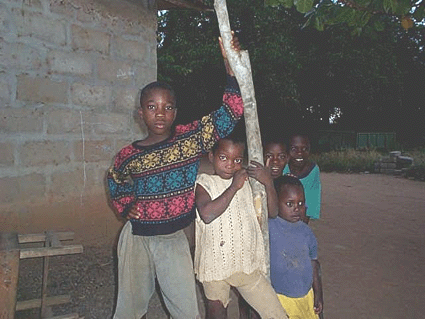
DEVELOPMENT CHALLENGE
The 1998 United Nations Human Development Index -which measures key indicators such as life expectancy, alphabetization and per captia income- ranks Ghana at 133 out of 175 countries. This indicators reflects some of the major problems that prevent development for instance: low rates of private sector investment, unsustainable population growth, inadequate sanitary system, low levels of educational attainment among the majority of its citizens, high inflation, budget deficit, low saving and weak in public and private sectors institutions. Cuts in agricultural sector with an indiscriminate use of forests resources are carrying erosion and loss of cultivable ground, sedimentation of waterways and alterations of marine ecosystem. A population growth rate of 2.9% per annum reduce improvements in the standard of living. While the 1998 energetic crisis had a modest negative impact on industrial activity, the growth in GPD for the year has a whole was 4.5%, down from a target of 5,6%. Progress has been made in reducing the high inflation rate of between 40-50% during the preceding year down to less than half the amount by mid year. However, double digit inflation and an acute shortage of affordable credit for investment continues to hamper economic growth. The Government of Ghana is committed to Ghana's achieving middle-income country status by the year 2020; a plan known as Vision 2020. Achieving this goal will require annual real economic growth rates of over 8% between now and 2020. The most significant challenge in meeting these growth targets lies in overcoming Ghana's fundamental economic problems -lack of investment capital and high inflation- that prevent the economy from realizing its full growth potential. Equally important will be improvement in sanitary services and basic education. The government is enacting reforms to address these problems, including liberalization of the foreign exchange, cutting government spending, privatization of state owned enterprises and legislative changes with reduction of the government rules in economic field. A growing and diversified economy, complemented by better quality educational with a development of sanitary services, reduced population growth with a more effective interaction between citizens and government will generate increased investment, higher income and a better quality of life for the majority Ghana's citizens. The government decentralization program is taking an important step forward with establishing of district assemblies with greater control over local resources. Ghana's transition to democracy is still fragile. A traditional strong executive branch must learn to share power with an increasingly influential and popularly elected parliament. The government has shown his appointment in the reforms, but limited resources and low income will do that country requires economic support in the short and middle term in order to reach Vision 2020 objective. A financial assistance and a design cooperation will be contribution keys for the transition from military regime to democracy and from economic crisis to a better competitiveness on world markets. With this perspective of economic resumption, population applications will become more and more demanding and detailed. Above all, in sanitary services field, there will be a great demand of qualified treatments with consequent relapses in specialist sectors like dentistry and odontotechnology. Comboni Centre's school/ laboratory wants to insert in a dynamic culture in way to carry improvements in professional education field, create jobs opportunity, and reduce poverty in favor of a sustainable development. A priority intervention aspect will be the great effort to guarantee that reached results will continue after assistance conclusion.

Village childredn